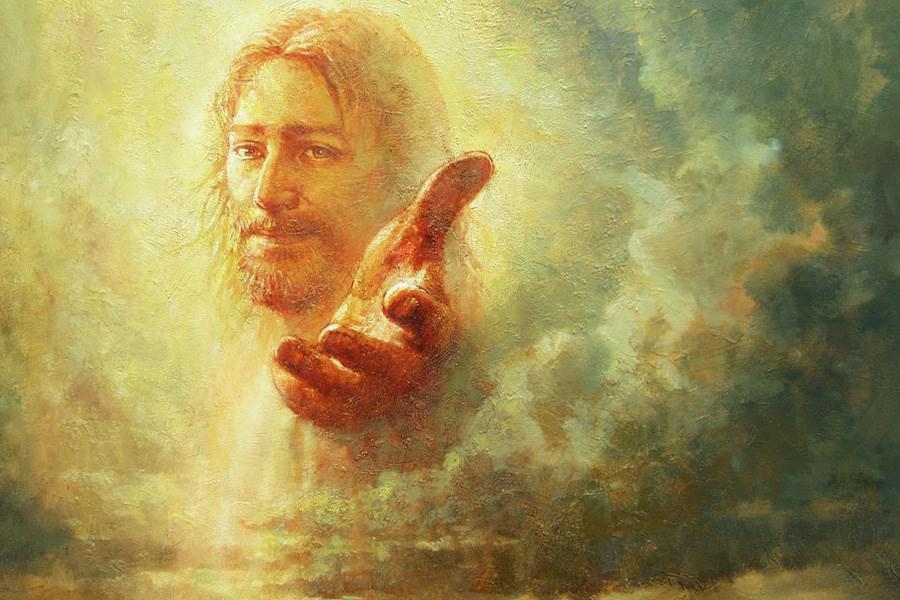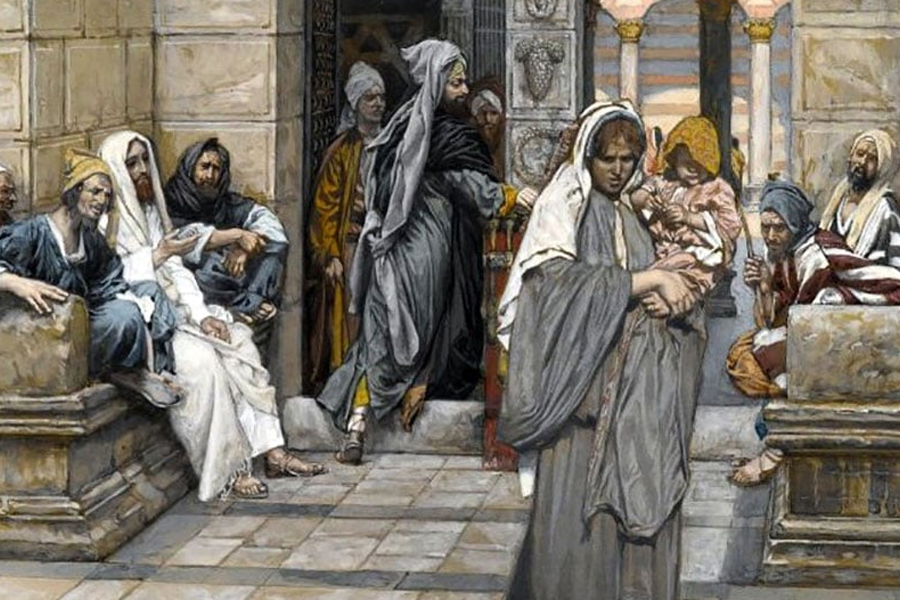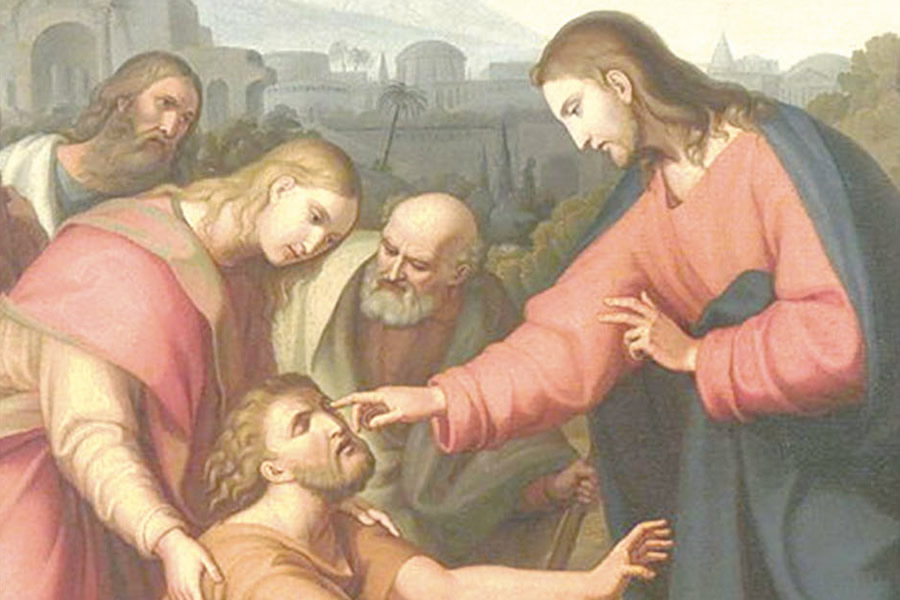St. Francis of Assisi Weekly Reflections

The Son of Man Coming in the Clouds
11-17-2024Weekly ReflectionWe Celebrate Worship Resource, Vol. 49, No. 1The stars have had a special symbolic significance going back to the beginning of our faith. God told Abraham to look at the stars in the night sky, promising him that his descendants will one day be as numerous. Today we hear that in Daniel’s prophetic vision, “those who lead the many to justice shall be like the stars forever” (Daniel 12:3). The uncountable multitude of souls guiding us to justice from their eternal home recall the uncountable multitude of stars Abraham and Sarah glimpsed in the heavens. Jesus told his disciples that while he was in the world, he was the light of the world. It is up to us now to reflect the light of Christ to the world, to be beacons for others, to make the works of God visible. One day the Lord will return to gather his elect and bring them home to the Father. May his warning that no one knows when this will happen spur us to action, to provide light to our world now, whether the world ends soon or far, far in the future.
How do you reflect the light of Christ in the world? What more can you do to shine that light in the darknesses around you?
El Hijo del Hombre viene en las nubes
Las estrellas han tenido un significado simbólico especial desde el comienzo de nuestra fe. Dios le dijo a Abraham que mirara las estrellas en el cielo nocturno, prome éndole que un día sus descendientes serían tan numerosos como ellos. Hoy escuchamos que en la visión profé ca de Daniel, “los que conducen a la mul tud a la jus cia serán como las estrellas por siempre” (Daniel 12:3). La incontable multitud de almas que nos guían hacia la jus cia desde su hogar eterno recuerda la incontable multitud de estrellas que Abraham y Sara vislumbraron en los cielos. Jesús dijo a sus discípulos que mientras él estaba en el mundo, era la luz del mundo. Ahora nos toca a nosotros reflejar la luz de Cristo al mundo, ser faros para los demás, hacer visibles las obras de Dios. Un día, el Señor regresará para reunir a sus elegidos y llevarlos a casa con el Padre. Que su advertencia de que nadie sabe cuándo sucederá esto nos impulse a la acción, para brindar luz a nuestro mundo ahora, ya sea que el mundo termine pronto o muy, muy lejos en el futuro.
¿Cómo reflejas la luz de Cristo en el mundo? ¿Qué más puedes hacer para que esa luz brille en las nieblas que te rodean?

She Contributed All That She Had
11-10-2024Weekly ReflectionWe Celebrate Worship Resource, Vol. 49, No. 1We just heard Jesus teach what love of God and love of neighbor are the most important of all God's commandments. Today we meet two people who have taken this to heart. Each is a widow. Each sacrifices her own well-being to give all that she has to God and neighbor. In the first reading, a widow has hardly anything left to give her young son. She expects that they will soon die of hunger. But she gives the last of her bread and water to this stranger, this man of God, rather than kingly telling him no, that she can't spare any of what little she has left. In the Gospel, a widow contributes two coins to the temple treasury-all she had-as an offering to God and to those in need. The incredible sacrifice each woman makes would look foolish to many. But note that not long after this incident, Jesus will look foolish to many, sacrificing his life on the cross for our salvation. The two selfless women sacrifice all that they have as well, not knowing how they will survive themselves, but believing that generosity to God and to neighbor is more important.
How generous are you? How can you bring yourself to be more generous to God and others?
DIO TODO LO QUE TENIA
Acabamos de escuchar a Jesús enseñar que el amor a Dios y al prójimo son los mandamientos más importantes de Dios. Hoy nos encontramos con dos personas que se lo han tomado muy en serio. Ambas son viudas. Cada una sacrifica su propio bienestar para dar todo lo que ene a Dios y al prójimo. En la primera lectura, una viuda no ene casi nada para darle a su hijo pequeño. Ella espera que pronto mueran de hambre. Pero ella le da lo úl mo que le queda de pan y agua a este extraño, este hombre de Dios, en lugar de decirle majestuosamente que no, que no puede prescindir de nada de lo poco que le queda. En el Evangelio, una viuda contribuye con dos monedas al tesoro del templo, todo lo que tenía, como ofrenda a Dios y a los necesitados. El increíble sacrificio que hace cada mujer parecería tonto para muchos. Pero note que no mucho después de este incidente, Jesús parecerá tonto para muchos, sacrificando su vida en la cruz por nuestra salvación. Las dos mujeres desinteresadas también sacrifican todo lo que enen, sin saber cómo sobrevivirán, pero creyendo que la generosidad hacia Dios y el prójimo es más importante.
¿Qué tan generoso eres? ¿Cómo puedes ser más generoso con Dios y con los demás?

The Greatest Commandment
11-03-2024Weekly ReflectionWe Celebrate Worship Resource, Vol. 49, No. 1It is incredibly rewarding for a teacher to see or hear that glimmer of understanding in a student, especially in a student who has failed to comprehend earlier lessons. Scribes had consistently failed to understand Jesus. They were more concerned about keeping Sabbath practices and eating with clean hands than about doing good for others. But today we meet a scribe who, when told that the greatest of all commandments is to love God with our whole self and to love our neighbor as ourselves, immediately points out that these are worth more than all the offerings made in the temple. Jesus, seeing that he “got it,” assures him, “You are not far from the kingdom of God” (Mark 12:34). We just honored the saints, whom we believe are in God’s kingdom. This is our goal as well. Today we are reminded of the means to that goal. The love and care that we have for ourselves must be turned outward, toward God and our neighbor. This sacrifice—not one of the burnt offerings, but the selfless one Jesus modeled for us on the cross—is the sacrifice Jesus calls us to make.
How will you show that you too understand the greatest commandment?
El Gran Mandamiento
Es increíblemente gratificante para un maestro ver u oír ese destello de comprensión en un estudiante, especialmente en un estudiante que no ha comprendido las lecciones anteriores. Los escribas habían fracasado constantemente en entender a Jesús. Estaban más preocupados por guardar las prácticas del sábado y comer con las manos limpias que por hacer el bien a los demás. Pero hoy nos encontramos con un escriba que, cuando se le dice que el mayor de todos los mandamientos es amar a Dios con todo nuestro ser y amar al prójimo como a nosotros mismos, inmediatamente señala que estos valen más que todas las ofrendas que se hacen en el templo. Jesús, viendo que lo había entendido, le asegura: “No estás lejos del reino de Dios” (Marcos 12:34). Acabamos de honrar a los santos, quienes creemos que están en el reino de Dios. Este es también nuestro objetivo. Hoy se nos recuerda el medio para alcanzar ese objetivo. El amor y el cuidado que tenemos por nosotros mismos deben dirigirse hacia afuera, hacia Dios y hacia el prójimo. Este sacrificio —no el de un holocausto, sino el desinteresado que Jesús modeló para nosotros en la cruz—es el sacrificio que Jesús nos llama a hacer.
¿Cómo demostrarás que tú también en endes el mayor mandamiento?

“Master, I Want to See”
10-27-2024Weekly ReflectionWe Celebrate Worship Resource, Vol. 49, No. 1All he wanted was to see. When asked, “What do you want me to do for you?” Bartimaeus responded simply, “Master, I want to see” (Mark10:51). He trusts Jesus, calling him “Master”, even throwing aside his cloak, which he’d used to collect the offering. What’s more, after receiving his sight, he immediately followed the Lord. Contrast this with others we’ve heard of recently. Last week, we heard Jesus ask the same exact question of James and John, but what they wanted was a special place in the eternal kingdom. Two weeks ago, we saw a man walk away when he was told he must sell all he had and give it to the poor in order to inherit eternal life. James, John, and the unnamed man wanted to see themselves in glory in heaven. But not Bartimaeus. He is like the blind, lame, and other vulnerable people Jeremiah speaks of in the first reading. Those people were specifically welcomed to return to the restored kingdom of Israel. Bartimaeus wants to see, but the fact that he chose to go with Jesus instead of going back home suggests that what Bartimaeus really wanted to see was the kingdom Jeremiah prophesied and Jesus promised. On this day, his wish was fulfilled.
How does your faith, like Bartimaeus’, help you see what others cannot?
“Maestro, Que Pueda Ver”
Todo lo que quería era ver. Cuando se le preguntó: "¿Qué quieres que haga por ?" Bartimeo respondió simplemente, "Maestro, quiero ver" (Mark10: 51). Con a en que Jesús lo llama "Maestro", incluso tirando a un lado su capa, que había usado para recolectar la ofrenda. Lo que es más, después de recibir su vista, inmediatamente siguió al Señor. Contraste esto con otros de los que hemos oído hablar recientemente. La semana pasada, escuchamos a Jesús hacer la misma pregunta exacta de Santiago y Juan, pero lo que querían era un lugar especial en el reino eterno. Hace dos semanas, vimos a un hombre alejarse cuando le dijeron que debía vender todo lo que tenía y dárselo a los pobres para heredar la vida eterna. James, John y el hombre no identificado querían verse a sí mismos en la gloria en el cielo. Pero no Bartimeo. Es como el ciego, cojo y otras personas vulnerables de las que Jeremiah habla en la primera lectura. Esas personas fueron bienvenidas específicamente para regresar a un reino restaurado de Israel. Bartimeo quiere ver, pero el hecho de que eligió ir con Jesús en lugar de volver a casa sugiere que lo que Barmeo realmente quería ver era el reino Jeremías profetizado y que Jesús prometió. En este día, su sueño fue cumplido.
¿Cómo te ayuda tu fe, como la de Bartimeo, ver lo que otros
no pueden?

He Came To Give
10-20-2024Weekly ReflectionWe Celebrate Worship Resource, Vol. 49, No. 1Jesus was not very explicit when he called the disciples. “Come, follow me” is a pretty vague invitation. But over time the disciples came to realize their mission. Jesus set an example for them, teaching, healing, and forgiving those who came to him. He even invited the disciples to go out in pairs and do the same. But all this recent talk about the kingdom and eternal life has distracted them. James and John decided to ask Jesus for a special place in this eternal kingdom. It is time for Jesus to summon the Twelve all over again to remind them of their mission. The goal of Christ’s mission is service, not glory. The focus is on others, not oneself. Jesus “did not come to be served but to serve” (Mark 10:45). When we were first called, we may not have understood our mission. Certainly not if we were baptized as babies! Sometimes we need to be summoned again. And again. Out of love for our neighbor, we are called to sacrifice our own desires, our own possessions (recalling last Sunday’s Gospel), and even our own lives. Let us work to recognize Christ in our neighbor, making us eager to serve others.
What will you do this week to serve others in a new way?
El Vino A Dar
Jesús no fue muy explícito cuando llamó a los discípulos. “Ven y sígueme” es una invitación bastante vaga. Pero con el tiempo los discípulos se dieron cuenta de su misión. Jesús les dio el ejemplo, enseñando, sanando y perdonando a quienes acudían a él. Incluso invitó a los discípulos a salir de dos en dos y hacer lo mismo. Pero toda esta charla reciente sobre el reino y la vida eterna los ha distraído. Santiago y Juan decidieron pedirle a Jesús un lugar especial en este reino eterno. Es hora de que Jesús vuelva a convocar a los Doce para recordarles su misión. El objetivo de la misión de Cristo es el servicio, no la gloria. El enfoque está en los demás, no en uno mismo. Jesús “no vino para ser servido, sino para servir” (Marcos 10:45). Cuando fuimos llamados por primera vez, es posible que no hayamos entendido nuestra misión. ¡Ciertamente no si fuimos bau zados cuando éramos bebés! A veces necesitamos que nos convoquen de nuevo. Y otra vez. Por amor al prójimo, estamos llamados a sacrificar nuestros propios deseos, nuestras propias posesiones (recordando el Evangelio del domingo pasado), incluso nuestra propia vida. Trabajemos para reconocer a Cristo en nuestro prójimo, lo que nos hará estar deseosos de servir a los demás.
¿Qué harás esta semana para servir a los demás de una manera nueva?

All Things Are Possible With God
10-13-2024Weekly ReflectionWe Celebrate Worship Resource, Vol. 49, No. 1After hearing today’s Gospel, we may go away just as sad as the man who asked Jesus what he must do to inherit eternal life. Sell everything we have? Is it easier to thread a needle with a camel than for a rich person to get into heaven? What?
READ MORE
The Two Shall Become One
10-06-2024Weekly ReflectionWe Celebrate Worship Resource, Vol. 49, No. 1Again and again, Jesus tries to change his followers’ perspective. He refuses to be trapped by the rules and traditions of the me, even when their origins are in Mosaic law. Today he is asked about marriage and divorce. At the time, only the husband could initiate a divorce. Jesus responds by focusing on the holiness of the marriage covenant. God has blessed the union of the pair in marriage. Their marriage is made holy by God’s presence. When two people give themselves to each other in marriage, they become a new creation, “one flesh”, as we hear twice today (Genesis 2:24; Mark 10:8). Regrettably, unforeseen impediments or irreconcilable differences can lead to the breaking of that covenant, but if divorce is used as an easy way out, the gift of marriage is trivialized. Ideally, a couple works to strengthen and nurture the bond between them, much as we strive to strengthen and nurture the bond between Christ and us, the Church. Often that means putting our faith in the Lord, as the children who come to him do, for Jesus’ embrace, after all, is the embrace of the kingdom of God.
What do you do to strengthen and nurture the bond between you and your spouse or the bond between Christ and you as the Church?
Los Dos Serán Uno
Una y otra vez, Jesús intenta cambiar la perspectiva de sus seguidores. Se niega a dejarse atrapar por las reglas y tradiciones de la época, incluso cuando sus orígenes están en la ley mosaica. Hoy se le pregunta sobre el matrimonio y el divorcio. En ese momento, solo el esposo podía iniciar un divorcio. Jesús responde centrándose en la santidad del pacto matrimonial. Dios ha bendecido la unión de la pareja en matrimonio. Su matrimonio se santifica por la presencia de Dios. Cuando dos personas se entregan el uno al otro en matrimonio, se convierten en una nueva creación, “una sola carne”, como escuchamos dos veces hoy (Génesis 2:24; Marcos 10:8). Lamentablemente, impedimentos imprevistos o diferencias irreconciliables pueden llevar a la ruptura de ese pacto, pero si el divorcio se usa como una salida fácil, el don del matrimonio se trivializa. Idealmente, una pareja trabaja para fortalecer y nutrir el vínculo entre ellos, de la misma manera que nos esforzamos por fortalecer y nutrir el vínculo entre Cristo y nosotros, la Iglesia. A menudo eso significa poner nuestra fe en el Señor, como lo hacen los niños que se acercan a Él, porque el abrazo de Jesús, después de todo, es el abrazo del reino de Dios.
¿Qué haces para fortalecer y nutrir el vínculo entre tu y tu cónyuge o el vínculo entre tu y Cristo como Iglesia?